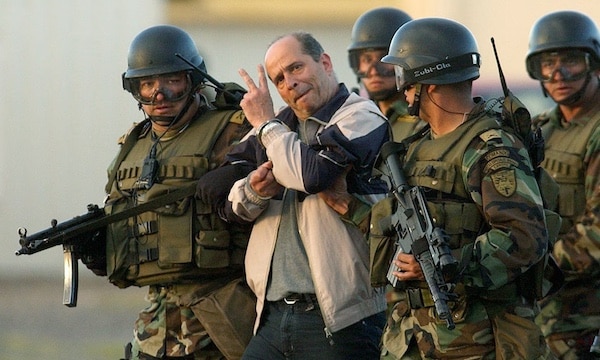Human rights organizations launch an international campaign to return Colombian peace negotiator Simon Trinidad back to his home country after being imprisoned in a U.S. supermax prison for over 20 years.
Many believe that Ricardo Palmera, better known by his nom de guerre, Simón Trinidad, can play a key role in achieving peace in Colombia, a country devastated by centuries of social, political, and armed conflict.
For 20 years, the former peace negotiator of the Revolutionary Armed Forces of Colombia (FARC) has been serving time in a U.S. maximum security prison after he was captured in Quito, Ecuador by CIA, Ecuadorian, and Colombian intelligence in 2004 and extradited to the United States on trumped-up narco-trafficking charges.
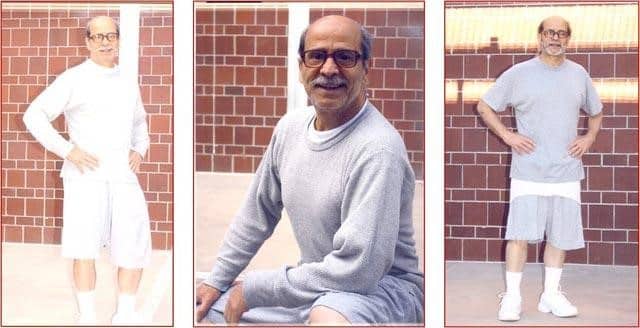
Trinidad faced multiple spurious trials between 2006 and 2008. After four, the completely false allegations of drug trafficking that gave legal pretext for his extradition were dropped. The U.S. federal justice system did however manage to concoct and convict Trinidad on a 60-year sentence for the single charge of conspiring to kidnap three U.S. citizens. The citizens, released in 2008, were military contractors of Northrop Grumman, one of the largest weapons manufacturing companies in the world.
There is no evidence to suggest that Trinidad had any role in the capture of the American drug war mercenaries whose plane was shot down in FARC territory while flying over the Caquetá region, an area Trinidad never operated in or was responsible for. The contractors were part of a spying mission overseen by the U.S. Southern Command, funded by the notorious “Plan Colombia,” a military aid initiative created in 1999 that invested billions of dollars into the extermination of leftist guerilla groups and peasant civilians under the guise of combating narcotrafficking.
The U.S. has funded, directed, and otherwise waged a mostly proxy war against the FARC since May 27, 1964. On that date, the Colombian Armed Forces unleashed a unilateral assault proposed by the Pentagon against semi-autonomous rural communities. That war was officially ended with the accords of 2016, yet it continues against remnants of the former FARC and other armed groups. Trinidad’s real crime has been his position as a high-ranking official within a revolutionary Marxist organization that poses a threat to U.S. imperialist interests. This alone was reason enough to convict him of the bogus crime of conspiracy.
Human rights activists fight to return Simón to Colombia
Like the case with many other political prisoners of the United States that have chosen the path of liberation and resistance—Leonard Peltier, Mumia Abu-Jamal, and Jamil Al-Amin to name a few—the United States, under law, holds the keys to Simón Trinidad’s freedom indefinitely, until death. Locked up in a 7ft by 12ft cell within the prison notoriously nicknamed the “Alcatraz of the Rockies,” the U.S. hopes to set an example for anyone who dares to undermine its seemingly pervasive authority. On the contrary, Simón Trinidad inspires hope and resilience in people struggling for peace and justice in Colombia and the world!
After 20 years too many, human rights organizations are saying enough is enough! It’s time to free Simón Trinidad! Led by the Coordinadora Americana por los Derechos de Los Pueblos y de las Víctimas de la Prisión Política, an international campaign has been launched demanding U.S. and Colombian governments repatriate Ricardo Palmera to Colombia before the end of President Biden’s term on January 20, 2025, so he can take part in Colombia’s Total Peace Plan. An open letter to Biden’s and Petro’s administrations, signed by over 300 individuals and human rights organizations from around the world, is making the following appeal:
- That the administrations of Colombian President Gustavo Petro and U.S. President Joe Biden take the relevant and necessary legal steps to repatriate Ricardo Palmera to Colombia as soon as possible so that he can participate in the development of the Total Peace Plan;
- That until Palmera is repatriated to Colombia, that he be allowed to participate in virtual sessions with the Special Jurisdiction for Peace (JEP).
You can sign the letter at the following link: bit.ly/bringsimonhome
20 years too many: Inhumane conditions at U.S. Supermax Prison
For two decades, Simón Trinidad has endured solitary confinement, denial of medical care, perverse judicial proceedings, psychological torture, and more. ADX Florence in the state of Colorado is one of the strictest maximum security prisons in the world, where allegedly the most dangerous and disruptive criminals are kept under inhumane living conditions. Under strict security measures, Simón was in isolation for 12 years. He wasn’t allowed to read or write. He wasn’t allowed to learn English, the language of the country that holds him captive. He is also not allowed to receive or send mail except from a few family members, and that mail is monitored by the FBI. He is only allowed a handful of pre-authorized visitors. He is effectively barred from virtually any interaction with the rest of the world.
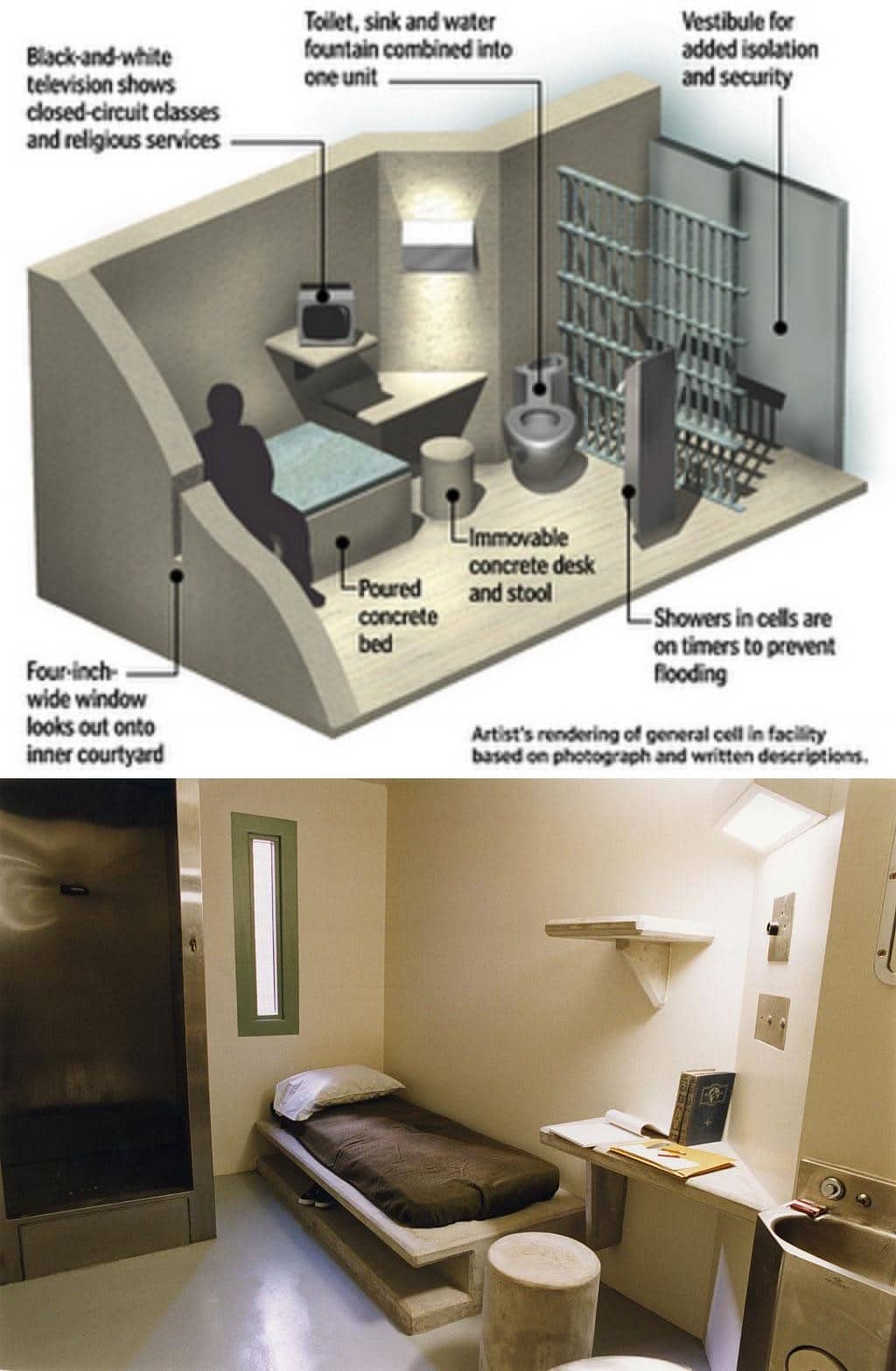
Last year, Solitary Watch released an egregious report finding that more than 122,000 people were currently in solitary confinement for 22 hours or more a day in the United States, a figure that they caution is an undercount. The report also cites the devastating physical, mental, and behavioral harm that solitary confinement does to a human being. After years of isolation, Simón was recently granted permission to interact with other prisoners and exercise outside his cell for a couple hours a day. Still, his conditions can only be described as undignified, torturous, and completely unjust.
Simón’s role in Colombia’s peace process
Simón’s involvement in the peace process is essential. The FARC made this clear at the Havana peace talks with the Colombian government from 2012 to 2016 when the FARC peace negotiating team appeared in Cuba with a life-size cutout of Trinidad demanding he be present at the table.
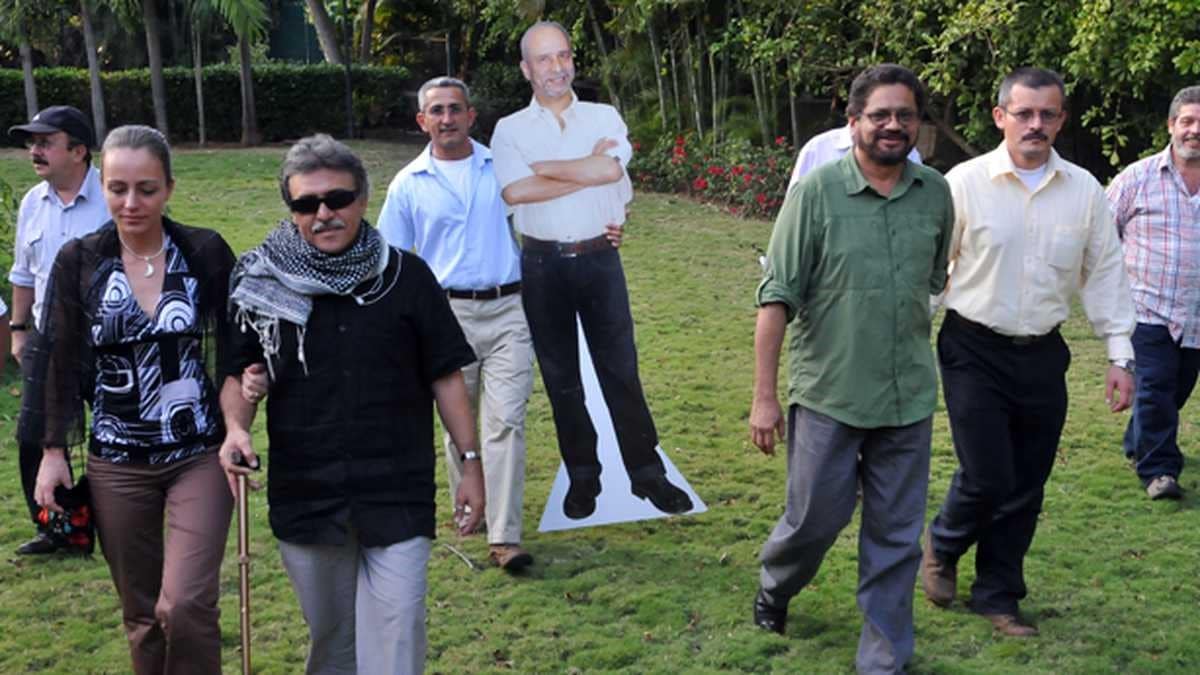
FARC negotiator Mauricio Jaramillo announced Simón as “the symbol of the dignity of the popular fighters of Latin America.” During the talks, the then-president of Colombia, Juan Manuel Santos, suggested in a radio interview that he was open to Simón’s return, but that his release did not depend on the Colombian government.
Colombia’s Special Jurisdiction for Peace (JEP), the transitional justice system established after the 2016 signing of the peace accords and designed as a mechanism to investigate, judge, and sentence anyone responsible for committing human rights violations during the armed conflict, has also requested his participation in judicial hearings on multiple instances. In June of this year, the JEP granted Simón Trinidad amnesty for rebellion after it was determined that he was eligible for the benefits granted to ex-FARC guerillas under the peace accords.
Tainted by a long history of war, displacement, and state-sanctioned violence, Colombians have worked tirelessly to achieve peace, a deadly endeavor in a country with one of the highest rates of assassinations of social leaders. Following the historic peace process of 2016 between the government and the country’s largest and longest-running peasant-led insurgent group, a new doorway to peace has been opened via the election of President Gustavo Petro and Vice President Francia Márquez.
For the first time in its 200 years, the country elected a left-leaning president who vowed to make the total peace plan his priority. This progress has only been realized through the political will of the people and their longing for peace, which has incited a wave of popular uprisings and organized resistance in the last decade, marking a new era of consciousness and change.
The birth of “Simón Trinidad”
Palmera’s alias “Simón Trinidad” was also born out of popular mass struggles for change. The guerilla leader grew up in a wealthy and politically influential Colombian family, was Harvard-educated, and held illustrious positions as an economics professor and a bank manager in Valledupar in northern Colombia before joining the FARC. His humanist nature, the political and social circumstances of the time, and the massive inequality and corruption he witnessed while working at the Banco de Comercio in Valledupar pushed him to become politically active in leftist organizations and advocate for the campesinos and working class.
It was in 1987 after witnessing the killing of most of his friends and comrades within the leftist political party, Unión Patriótica, that Palmera, under threat himself, decided to leave his family and career and join the rebel guerillas in the mountain, adopting the new name. The state at the time was undertaking a genocidal campaign against a popular and progressive movement in Colombia, killing some 6,000 UP members throughout the 1980s and 1990s and sending others in exile. Some UP members were ex-combatants of the FARC who had opted for an electoral process but resumed to take up arms after the violent assault on the party.
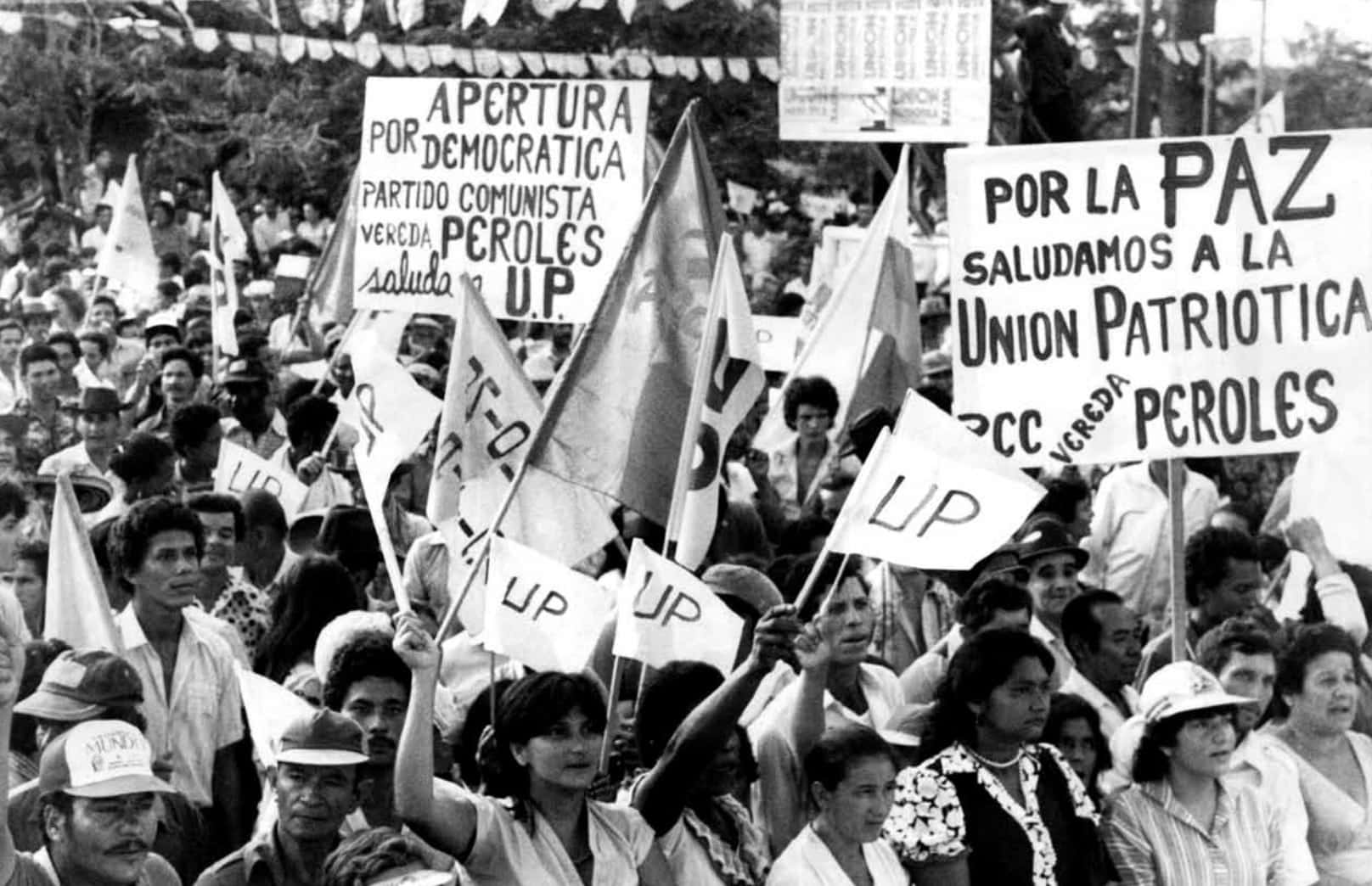
Despite joining at the unusual age of 37 (the norm to enter the FARC is 15 to 30 years old), he rose in the ranks as a leading intellectual and economist, not a military man. He was in charge of political education and propaganda and later became a lead negotiator during the peace talks with the Pastrana administration from 1998 to 2002. It was during a prisoner exchange mission in Ecuador via an invitation by the United Nations that Trinidad would be captured and eventually extradited to the United States. The extradition treaty between the U.S. and Colombia prohibits extradition “for political or military offenses.” It also prohibits extradition where the request, while involving an offense not political in nature, “is made for political purposes.” Simón’s case is one of many examples of the U.S. using extradition law as a political weapon to undermine national sovereignty and punish political opponents.
Colombians have every right to demand Trinidad be returned to Colombia to participate in the peace process and any political meddling by the U.S. should be questioned. The U.S. has invested billions of dollars to stoke the flames of war, conflict, and repression in Colombia, across the world, and also at home. The people of the United States have the right to demand that those dollars be invested in human development and healing our land, in building peace rather than prolonging conflict. Simón Trinidad’s freedom is indispensable in achieving peace.
Tanya Núñez is a National Co-Coordinator for the Alliance for Global Justice based in the United States. She is responsible for Colombia solidarity and the Infrastructures of Empire programs. She is a coordinator and popular educator of Lucy Parson’s Human Rights School. She is also an independent video journalist with a Fine Arts degree in Film and Television.

